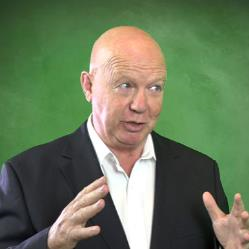 . Customer Feedback Session - Image by Opolja[/caption]
. Customer Feedback Session - Image by Opolja[/caption]
How can we assess the health of our account relationships? - Interview by John Smibert.
In this Interview Cian McLoughlin shares some listening strategies for improving account retention
 Cian made it clear that we need to be formally and regularly engaging with our customer to ensure we have answers to questions like "What is happening? How are we tracking? What are you enjoying? What are we doing well? Where's our gaps? Where our holes? What could we do differently?"
Cian made it clear that we need to be formally and regularly engaging with our customer to ensure we have answers to questions like "What is happening? How are we tracking? What are you enjoying? What are we doing well? Where's our gaps? Where our holes? What could we do differently?"
And most importantly Cian says "Don't ask these questions if you're not going to act on the feedback." The customer will potentially highlight a negatives, which is fine so long as we go ahead and address them and demonstrate we take their feedback very seriously. The customer must see action.
Cian outlines the process and important characteristics of gaining feedback from customers to ensure the process has credibility and results in increased chance of account retention and growth.
See the interview below to learn more.
Cian McLoughlin is a guru in win/loss analysis, he's a speaker, an author, and a leading advisor to the sales fraternity.
See more of the 'TALKING SALES' series here
Interview
John: Welcome back! I'm here with Cian McLoughlin. Cian's a guru in win/loss analysis, and I've just found out that he's a guru in customer retention as well. He's also an author, a speaker, and a great advisor and consultant to the sales fraternity. Welcome!
Cian: Thanks, John! Nice to be here.
John: Cian, tell me a little bit about retention. You obviously do a lot of work in win/loss. Is that related to customer retention? And what should we be doing to ensure we retain our customers?
Cian: That's a great question. The thing about win/loss is that invariably it happens at the end of the sales process. We've won or we've lost, and we want to understand what happened and why and what can we learn from it. But, I think we need to recognise that we have a whole group, hopefully, of existing customers, and we have to ask ourselves; "what is our strategy to retain those customers, to ensure that that relationship is working as well as it should do". Particularly when some customers are on a three-year contract or a four, or five year contract - what's our strategy to mitigate the risk of them going out to market again - or them moving to a competitor. And the win/loss process can actually play a really integral role in helping us to do that.
John: In what way?
Cian: Well, win/loss is really about taking quantitative and qualitative questions and saying "What happened? Let me understand?" etc., etc. So, you just change the tense from past tense to present tense - "What is happening? How are we tracking? What are you enjoying? What are we doing well? Where's our gaps? Where our holes? What could we do differently?" And it's having a different conversation with a customer than the one we might be having with them day-to-day.
John: I've done a lot of work in that sort of area too, and I think that the real knowledge that we often forget to look at-to me customer satisfaction is not the measure.
Cian: No, I agree.
John: It's the 'customer's perception of value' they get through the relationship, and measuring the 'customer perception of value' and getting feedback on that is vital to me.
Cian: I couldn't agree more. Another question that I get asked quite frequently is "Why would we use a third party to do that versus doing it ourselves?" and my response is "Do it yourselves. If you're not doing it, do it yourself." Be that win/loss or that "What are we doing from a retention perspective?" The reason why some organisations like to bring in a third party is because it creates a little bit of separation, so it allows the customer sometimes to be a little bit more frank and a little bit more candid in their feedback, because they're not speaking directly to the person the feedback's about or to the organisation it's about.
But also, what it does is it allows the vendor to then take that feedback, and it removes maybe some of the political implications or some of the-you know, the trickiness of feeding that back into an organisation that says "How can we act on this?"
John: I've actually experienced-we're doing it externally, but also if it needs to be done internally: using people that are independent of the relationship of that particular customer.
Cian: Correct, absolutely.
John: To actually have that discussion with the customer.
Cian: I agree, yes. Whether it's internal or external, you get someone who isn't related day-to-day to that particular customer, create a little bit of separation and you're going to get a much more valuable insight on that basis.
John: To throw a curve-ball in there - one of the things I've found is that often if the sales account manager sits in the meeting but in absolute silence then the customer is, in most cases, reasonably comfortable, and they follow a process that's being run by an independent person. The customer gets value because they know the sales account manager has heard very clearly, without responding and reacting, the thoughts in their mind and what they're talking about.
Cian: That's interesting. I have never been on the receiving side of that, but what I have observed a lot is that the feedback about the account manager is invariably pretty good. Not always, but a lot of the time they'll say "Look, they're responsive, they listen, they're proactive". Where there are issues sometimes is further up the food chain, or it relates to something [04:00] outside of the control of the account manager, be it price or product or something else. So yeah, I can certainly see the value.
John: And the customer certainly needs the opportunity to say "Hey, this time I don't want the account manager in the meeting."
Cian: Yes.
John: There may be reasons for that.
Cian: Absolutely. And there's one other point as well which is that... I say to organisations "Don't do this if you're not going to act on the feedback." Because what you're doing is highlighting potentially a negative, which is fine so long as you say "We're going to go ahead, we're going to address this and we take your feedback very seriously." And then the customer can see the action. Don't highlight it if you're not going to do something about it.
John: A couple of issues that I've seen is that people are afraid to ask the question, because if you're going to do this properly then you're not going to respond or react to the customer in that meeting.
Cian: Correct.
John: And the customer can set expectations to achieve something we're not willing to achieve.
Cian: That's absolutely right.
John: However, we need to hear that, we need to get it on the table; get the elephant out of the room.
Cian: Yes, that's right.
John: And then we can go back and say "Well, what your expectation is is something we can't deliver to you, but let's do something else."
Cian: "But maybe we can do this, or maybe we can do this."
John: Exactly.
Cian: And the fact that they've been heard and the fact that you've actually responded to them and taken the time to do that is huge.
John: Absolutely. Really, really important stuff. Thanks very much for your feedback on that, Cian!
Cian: Pleasure, John!
****************
More interviews with Cian McLoughlin:
***************

Your Invitation: I invite you to join the Sales Leader Forum group on LinkedIn where you can experience informative discussions with your peers and sales thought leaders on subjects like the one we have discussed here. I also invite you to subscribe to the
- Sales Leader Resource Centre here
- Sales Leader YouTube channel here (300+ sales leadership videos)
Please Share: If you valued this article, please share via your Twitter, LinkedIn, Google+ and Facebook social media platforms. I encourage you to join the conversation or ask questions. So feel free to add a comment on this post - I promise to respond. If inclined please follow my LinkedIn post page here.
Want to touch base? If you have questions please feel free to contact me - email: john.smibert(at)salesleaderforums.com, Phone: +61 404857893 or Skype: john.smibert